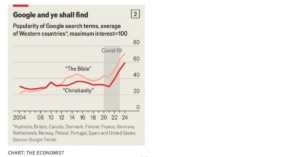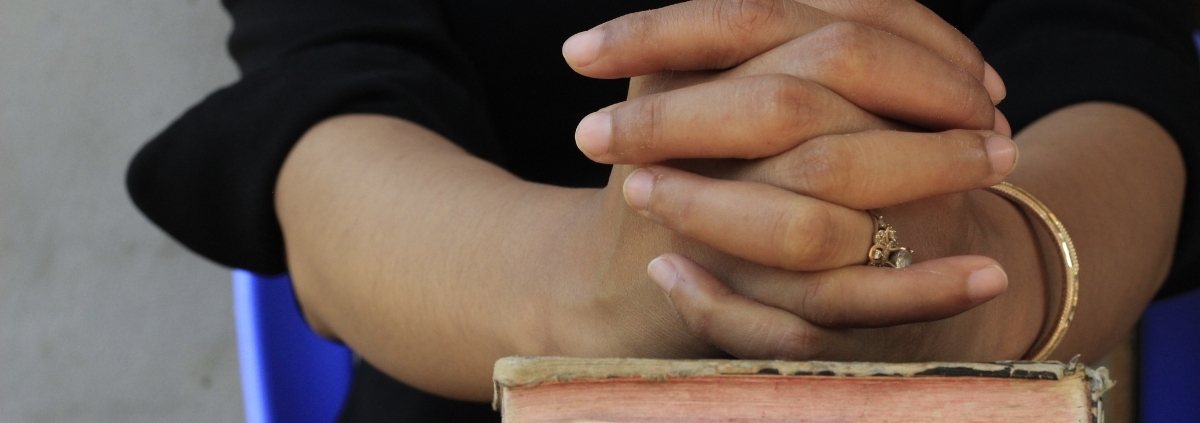Maybe not “More Christians” but definitely “More Christian” Christians.
By: Stephen McAlpine
Are we getting more Christians in the West? Or less? Is there a quiet revival? Or is that just noisy hope?
For every set of stats such as the Bible Society UK’s Quiet Revival report, there is a pooh-poohing naysayer who says that it’s all smoke and mirrors. And it’s hard to argue with the census data over the past twenty years.
Australian data shows that in the past two censuses an extra 900,000 people ticked “No Religion” each time. What’s the bet that that occurs again in 2026 with the next census?
But something is going on. We’re seeing a definite Christianity vibe shift. It’s clear that the public conversation around Christianity has increased hugely in the past few years. The algorithm doesn’t lie:

Whether at the intellectual level, with the likes of Ayaan Hirsi Ali and Tom Holland; the popular cultural level with the likes of Nick Cave and Joe Rogan, or the baldly theological conversation level – with the likes of spokespeople such as Justin Brierley and Wes Huff, the conversation is ramping up. So perhaps not a revival, but signs of spring. Or as Brierley would say, a returning tide.
And of course there are the anecdotes. If I had a fiver for every pastor or ministry leader who tells me that – contrary to any experience in the past – young people, especially young men, are turning up “cold” at church to ask questions about faith and baptism, then I’d race down to the Nike store and buy me a couple of pairs of those expensive carbon-plated racing shoes.
Put it this way, the stats may be still saying that religion is in decline, that there are less Christians. But what is becoming clear is that those who are Christians are more Christian! We’re not necessarily experiencing “more Christians”, but we are certainly experiencing a phenomenon of those who are either staying Christian, or indeed becoming Christian, being “more Christian”. They’re signing up for all of the add-ons.
They know there are few kudos from the world for holding Christian views, so they are coming to the faith with eyes wide open. They’re past caring whether they may get cancelled by people whose own lives are so despairing and whose opinions are so random, that they cannot be taken seriously. So there is a definite surge in interest right at the very time many were predicting the Christian branches to die off and wither completely.
Which kinda makes sense. Pope Benedict said of the church, “Pruned, it grows”. Perhaps what we have seen has been as much a work of God as anything else. Honestly? I want heterodox churches to die. I don’t want them hanging around like vultures seeking out the pickings. I also don’t want lost young people turning up at such churches and being made twice the sons of hell that they were from these cultural pharisees.
We knew that the pruning idea is a theological reality well before Benedict ever said it, but I believe we are seeing that now in a major way. The falling away was a necessary falling away. In fact what we have experienced the past couple of decades is John the Apostle’s assertions writ large and wide:
Dear children, this is the last hour; and as you have heard that the antichrist is coming, even now many antichrists have come. This is how we know it is the last hour. They went out from us, but they did not really belong to us. For if they had belonged to us, they would have remained with us; but their going showed that none of them belonged to us. (1John 2:18-19)
The collapse of nominalism in the West can, at some level, be linked to the ” going out” – the drift from a robust orthodox faith, that was experienced in the West. Not to say that dead orthodoxy doesn’t kill either, but not in this most recent decline. The terminal collapse of a modernist, progressive Christianity antithetical to orthodox beliefs and practices is antichrist in all of the ways that the Apostle John speaks of. And it shows that “Less Christian” is merely a stepping stone to “Not Christian at all”. At least not in any way that the Bible would describe.
But then again when the Bible is no longer authoritative in your Christian community, then it won’t be long before it isn’t a community of Christians. It won’t be long before it is a community of activists whose gospel seems, conveniently and suspiciously, to line up with whatever agenda is on the progressive “to-do” list this decade.
Don’t think, however, that progressives are re-examining their beliefs and saying “You know, maybe we got this wrong!” Not on your life! Such types tend to double down and see orthodox beliefs as the enemy of progress. They are withering and dying. They aren’t even robust to be pruned. They’re just dropping off.
But that’s no great loss. In fact the census data, including here in Australia, is proof that we are experiencing a reduction in the “More Christian” category, but simply a collapse of non-attending, non-observing nominalism.
Once it was easy to put a pencil strike through the religion of choice that you never engaged with. Now it’s just as simple to put an online “tick” on the “No Religion” option.
The fact that 1.8million Australians ticked the “No Religion” box in the last two censuses, is simply an acknowledgement of this nominal decline. Whoever they were, they weren’t you! You weren’t coming to census night after a particularly bad Kids’ Church experience on Sunday when one of the mums had a go at your pedagogy, and saying “Right, that’s it! I’m done with Jesus!”
By and large the young men seeking faith (and there is plenty of anecdotal evidence that young men are turning up unannounced at churches), are not seeking it in places that have deconstructed. Or in other words, apostatised. I’ve said it often, but no one is committing to churches that seem no different to what is on offer in the world. Why get out of bed on a cold Sunday for that?
So we may not be seeing “more Christians”, but we are definitely seeing that those seeking Christianity, are seeking the “More Christian” version of it. Or as James Marriott calls it in The Times article he wrote this past weekend, Full-Fat Faith. None of this skimmed milk version. And spare me the oat “milk” or almond “milk”. Or in US terms, give me the full 3.25 % stuff, none of this aenemic 2 per cent.
Marriott, an agnostic himself, makes this observation:
The pseudo-rebellious anti-Christian pose once common in the mainstream media makes little sense to younger people. “You don’t feel the need to rebel against it because it’s not hegemonic in the first place,” says Esmé Partridge, 25, a writer and recent convert. If you’re young, the establishment is obviously secular. Nowadays, it is precisely Christianity’s marginal status that lends it glamour and charisma, comparable perhaps to the appeal of exotic-seeming eastern religions in the 1960s. Bizarre as it may seem to older readers, “trad” Catholicism, with its mantillas, rosaries and the Latin Mass, has been a feature of New York’s edgier-than-thou hipster scene for so long it is now almost a cliché.
Which is all just hunky dory. Except of course, with this caveat: When we live in a culture in which to be on the edges is to be the “cool kids” then we might just find out that when “cool” shifts again, people will leave again in droves.
Yet my experience in talking to pastors is that no one is coming because of the “cool” factor. They’re coming primarily because of the other critical observation that Marriott makes:
Meanwhile, the traditional consolations of a well-lived secular life are weakening. Romance, friendship, family and materialism figure less prominently as sources of meaning in the lives of a generation that is poorer, lonelier, less sexually active, less sociable and less likely to start a family. And in the age of the smartphone, inane short-form videos and social media doom-scrolling are undoubtedly addictively entertaining but not very profound or spiritually nourishing.
The meaning and purpose bucket has been emptied by the shallowness of the modern immanent frame. It’s as if living life only for yourself and for your immediate pleasures and fulfilment – the expressive individualism we all speak of – isn’t the way life is intended to be lived. Fancy that!
Now this is not to say that many young people reject the traditional Christian faith because of its robust and angular (in their eyes) perspectives on sexual relationships. There are many young people seeking out Tarot, Psychic readings etc, which all offer you a sense of control over your world with any pesky ethical commitments. But there’s no “full-fat” in any of that stuff. It will exhaust itself eventually. I am confident of that.
So are there “more Christians” That much can be, and is being, disputed. But are those who are becoming Christian – especially the younger crowd – “more Christian”? That much seems to be clear. Let’s see where it goes.
Article supplied with thanks to Stephen McAlpine
About the Author: Stephen has been reading, writing and reflecting ever since he can remember. A former church pastor, he now trains church and ministry leaders, and in his writing dabbles in a number of fields, notably theology and culture.
Feature image: Canva




